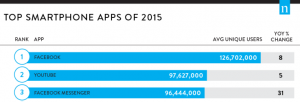First of all, Happy New Year. Welcome to 2016 – the year you may start eating healthier, the year you may pick up a new hobby, the year you promise to be more active – did you know this year also marks the 8 year anniversary of mobile apps?
If you keep up to date with our blog you know we have been making a lot of noise about mobile, so I’m not going to throw all the “why mobile” statistics at you. You must, by now, know the importance of mobile (it’s been 8 years after all!). While going mobile is one thing, ensuring mobile app success is another. In our last blog we talked about user experience, and while this is fundamental success factor, this is a front-end focus. I would like to draw your attention to the back-end success factor – mobile analytics.
The surfacing of machine learning and predictive analytics has had a profound effect on the business world. With valuable insights available at the tip of our fingers, segmentation and targeting is thoroughly executed, precise and pretty much instant! Gold dust for us marketers.
When we think of digital analytics we may think of opens and clicks in email marketing, page impressions or clicks in online advertising, web tracking, or even likes or comments on social media channels. These analytics have helped build the foundations of key business decisions and in the past have been primarily web-based. With mobile devices and mobile apps steadily catching up on desktop, there are now platforms available specialising in mobile.
Mobile analytics gives you a picture of how your customers are interacting with your app. Instead of tracking clicks, it can track taps; instead of web tracking, you can visualize navigation paths. Many features are similar to web and desktop, however as most of us know, consumer mobile interaction differs significantly from desktop interaction. Moreover, many predict mobile will overtake desktop as the primary consumer device. Why would you not invest in a mobile analytics platform?
Let’s delve deeper into the brilliance of mobile apps. A unique ingenuity of mobile apps is the ability to send out push notifications and deep linking.
What is a push notification?
You know when your phone beeps to tell you someone has liked your photo on Facebook? Or the newsbeat when your BBC News app has a breaking headline? Stripping back the code dialect, essentially, these are responsive push notifications that will automatically be sent to you via a server. You can also send out push notifications to certain individuals, created manually on a mobile analytics platform.
Considering that the average smartphone owner has 29 apps, realistically, an individual isn’t going to launch every app every day to check what’s new and what’s happening. Thus, push notifications are a fantastic way to keep users engaged and retain relationships. Is it any wonder the top 3 mobile apps utilize and embrace push notifications?
Source Time Magazine
What is deep linking?
Again, stripping back the technical dialect, conceptually, deep linking functions like hyperlinks, linking to a specific piece of content. Deep linking in push notifications make a perfect combination for instant customer engagement.
A push notification without deep linking means the user will have to go to the app and follow through the call-to-action manually. A push notification with deep linking means the user simply taps the notification to be directed to the specific content.
It is no surprise that deep linking is becoming one of the most popular mobile computing trends. Smarter, instant engagement allows you to retain and build your relationship with your customers.
With these two mobile features and a mobile analytics platform you gain valuable insights (in real time) such as:
- Whether an app was launched via push notification
- Unique campaign IDs to track which notifications are most effective
- Impact via consumer group, for example demographic or geographic
This knowledge will allow you to accomplish powerful, targeted messages with considerable impact. Furthermore, user analytics can usher key decisions making in app development for enhanced user experiences.
Proactive communication (company initiated – e.g. sending push notifications) allows for reactive communication (customer initiated – e.g. tapping push notification and opening app content), creating stronger customer relationships. A tasty formula for all businesses!
So what are you waiting for? Go mobile, invest in a mobile analytics platform and your company will be on the pathway for mobile success.
